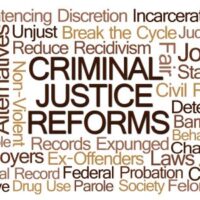Criminal Justice Reforms on the Horizon

The criminal justice system in this country is fraught with problems, but things may be looking up. The United States leads the world in the number of incarcerated individuals with more than five million people behind bars or some other control, and up to 100 million living with a criminal record dinging their opportunities. It’s well past time to take a look at what’s not working.
Decarceration and Sentencing
Washington D.C. is leading the way in eliminating mandatory minimum sentencing rules. They’ve also reduced maximum sentencing requirements to 45 years, and stretched the rules when it comes to reconsideration of lengthy sentences.
Racial Disparities
The Racial Justice Act for All in California gives anyone convicted of a crime prior to 2021 the ability to seek relief if they can prove an element of racial bias in their conviction. (They could already challenge cases that occurred during or after 2021).
Drug Policies
In Kentucky, individuals facing low-level, non-violent drug crime charges can have their cases put on hold as they undergo treatment and take advantage of vocational services. Meanwhile, states across the country are decriminalizing or legalizing cannabis use, and Colorado decriminalized psilocybin mushroom use.
Probation/Parole Changes
People in Florida who are on probation can now get workforce or education credits toward reducing the terms of their probation. They can earn:
- 60 off of probation for every educational activity completed;
- 30 days off of probation for every six-month period that they were employed for at least 30 hours/week.
Eliminating Involuntary Servitude
Vermont, Oregon, Tennessee and Alabama all adapted their state constitutions to remove language allowing involuntary servitude in prisons.
Voting Expansions
Jailed individuals in Washington State and in Massachusetts are now guaranteed the right to vote, and have funded programming to ensure detainees are registered and aware of their rights.
Youth Programs
In Indiana, the age of detention has been raised to 12, and improvements in data collection and youth diversion programs occurred.
The age of jurisdiction for juvenile courts in Maryland was raised to 13, and juveniles who incur technical violations of probation or who commit misdemeanors can no longer be placed in secure facilities with rare exceptions. Finally, diversion programs have been offered to youth who commit nonviolent felonies even without the consent of prosecutors and/or victims.
Tennessee tackled their mandatory 51-year sentencing requirements for youth offenders, substituting it with the opportunity for parole after 25 years served.
Re-entry Assistance
Here in Nevada, there is a strategic plan to help prepare inmates for their release by providing social relationships and building services through community-based programs. Support for housing, employment, education, and health services aim to improve recidivism rates.
Your Legal Advocate
The experienced, dedicated Las Vegas criminal defense attorneys at Lobo Law are committed to fighting for the best possible outcomes for our clients. To discuss your situation, schedule a confidential consultation today.
Source:
lims.dccouncil.gov/Legislation/B24-0416
